Фото: личный архив Юрия Гусева
Yuri Alexandrovich Gusev – Honored Doctor of the Russian Federation, Doctor of Medical Sciences, expert in the field of vision restoration and author of the book "All Eyes" has been actively introducing innovative technologies for the surgical treatment of cataracts, glaucoma, progressive myopia, including those developed by himself, into clinical practice for more than twenty years. He has more than fifteen thousand operations of various complexity on his eyeball.
In this interview, Yuri Alexandrovich will tell you how to preserve your eyesight from childhood and choose the right surgeon for the operation, dispel myths about ophthalmic surgery and share interesting stories from his practice.
— Can frequent interaction with the display of a phone or computer really affect vision?
— There are many articles and data that interaction with gadgets can somehow affect vision. On the one hand, this is true, but on the other – not at all. Since childhood, people of different ages spend more and more time at the computer or phone. Even elderly people, when you ask them what kind of vision they need after surgery, answer: "So that the phone can be clearly seen." And kids get used to smartphones, games and cartoons very early.
Unfortunately, we cannot stop the progress and make sure that children use the computer as previously recommended – 20-30 minutes, then a break. This will not work for anyone, it is impossible. And there is no convincing evidence that if a child spends a lot of time on the phone, then he will definitely develop myopia, and if he does not sit, he will not develop. There is no such scientific data, and there is no direct connection either
The radiation that some displays give has a negative effect on vision: the strong visible spectrum of blue light is harmful to the retina to some extent. It affects blood circulation, the work of receptors that accept a color image, but it does not cause myopia. Yes, prolonged and frequent use of a computer at close range can cause dry eye syndrome, discomfort, headaches, can increase fatigue and irritability, but ophthalmologists cannot approve a direct impact on the development of some eye diseases.
The only thing we can do is to create more comfortable working conditions at a computer or other gadget. To make the eye less tired, you need to work in a sufficiently lit room, preferably daylight, because it is more correctly perceived by the organ of vision. It is important to conveniently position the monitor in front of you so that the eyelids close properly and do not get tired when blinking, choose a comfortable distance, and so on. Frequent interaction with the display may not cause farsightedness or myopia, but may cause any visual dysfunction or discomfort with improper prolonged use of gadgets.
— А что в действительности способствует поддержке зрения, упражнения для глаз или, например, пищевые продукты, за исключением всем известных черники и моркови?
—The big question here is whether it's worth supporting at all. Because all sorts of massages or vitamins, especially at a young age, with the normal state of the organs of vision are not necessary and are absolutely not advisable.
The use of blueberries, carrots and other products is quite limited, and the use of these foods is controversial. It is believed that in some cases it is useful as a prevention of the development of certain diseases, for example, age-related macular degeneration (*Progressive eye disease that leads to a decrease in visual acuity due to damage to the central part of the retina of the eye – the macula) and diseases of the retina. But I don't think that if teenagers who spend a lot of time at the computer or on the phone eat more carrots, then they will develop myopia or other visual impairments more slowly.
Yes, ophthalmologists sometimes recommend using certain foods more, taking vitamin complexes for the treatment and prevention of some eye diseases, but this is a separate topic. In some forms of eye diseases, for example, age-related retinal diseases, the use of vitamin complexes, dietary supplements and products is justified.
— Но можно ли тогда как-то замедлить падение зрения, и если да, то как?
— Patients who lose visual acuity should not only visit an ophthalmologist once a year as a preventive measure, but also contact specialists at an early stage of the appearance of such complaints in order to receive treatment in a timely manner. But if by the word "deterioration" we mean deterioration of nearsightedness or farsightedness, then we must understand that in this case the optical properties of the eye change due to changes in the lens.
There are practically no scientific ways to slow down myopia. Previously, the well-proven operation "scleroplasty" was actively used. It was not always possible to stop the progression of myopia with its help, but still the operation was, in my opinion, extremely useful, because it solved several tasks at once – stabilized the progression of myopia, prevented excessive growth of the eyeball, improved blood circulation in the vascular membrane of the eye, strengthened the sclera and so on.
But in recent years, this operation is done infrequently, the surgical method has been replaced by such a method as wearing orthokeratological lenses (so-called "night" lenses). This is a modern way that has its supporters and opponents. It consists in the fact that a child or teenager puts on specially selected contact lenses at night, and due to this there is a certain effect on the cornea of the eyes as a whole and the growth of myopia slows down. Perhaps these are the main ways that allow you to slow down or stop the growth of myopia.
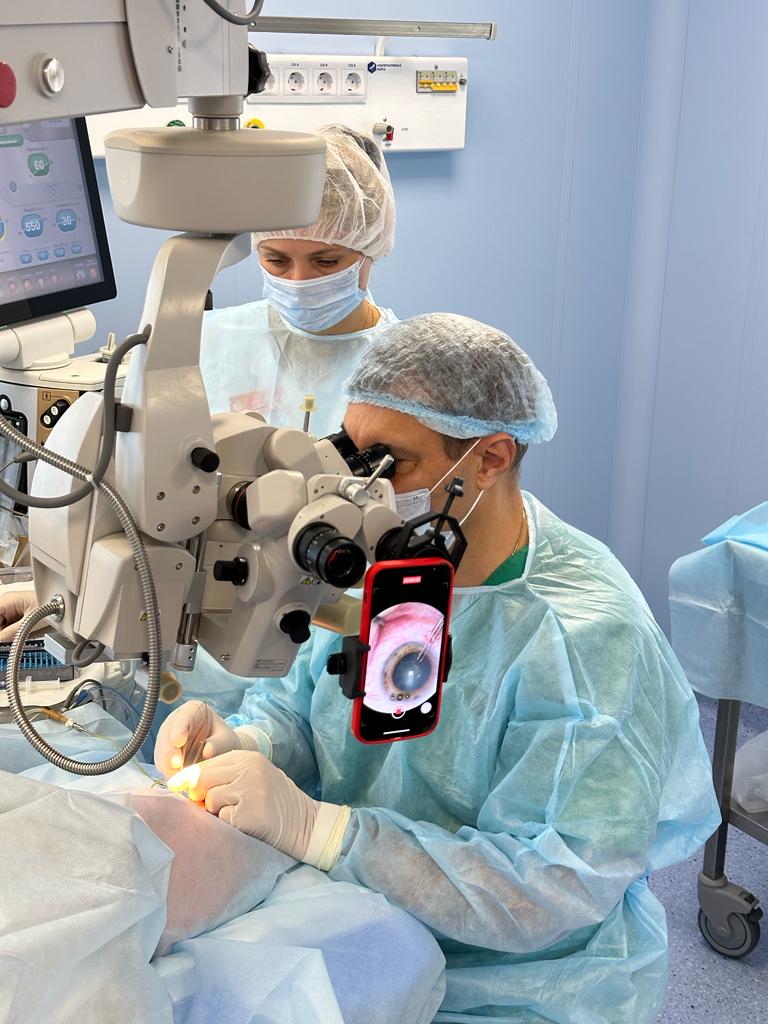
— It is known that poor eyesight is inherited. Is it possible to do something to break this chain and protect your future children?
— It is impossible to interrupt this chain, because after all, it is transmitted at the genetic level from parents to child. If one of the parents has myopia, then the probability of its development in the child is 30-60%, if both parents are myopic, then this probability increases to 80-90%. There's nothing you can do about it.
But prevention, probably, still consists in timely observation by ophthalmologists so that parents know about the situation. They should consult a doctor more often if their children have a tendency to myopia, check and monitor their eyesight, create the right visual load regime, help ensure that the child is more outdoors, create more correct conditions for the development of the visual organs, and, of course, the most important thing in this case is if the child began to develop myopia, try not to have the so-called amblyopia. This is a condition in which the retina does not develop well enough, which is why a child may have reduced visual acuity when growing up.
That is, the ability of the retina to have sufficient resolution can be missed. In adolescence, this is due to the fact that in childhood parents did not pay enough attention to this problem. And this needs to be done, you need to be observed by a pediatric ophthalmologist and correctly select vision correction so that there is a proper load on the organs of vision and so that the child walks in comfortable glasses. In some cases, do exercises on special devices that develop the accommodative ability of vision and optimize visual load. All this is the key to maintaining a sufficiently high visual acuity and proper physiological development of his organs.
— For each age, there are different methods of treatment that help to achieve high quality vision. Is it so?
— The development of the visual organs lasts up to 18-19 years. After that, the anatomical parameters of the eye, as a rule, do not change. The eye grows completely, its size and physiological parameters remain for the rest of its life, and after that they do not change in any way. If a young man or a girl has nearsightedness, then by this time she has already stopped and a person can use glasses to work at a long distance, to watch movies, drive a car or play sports. If it is inconvenient, then you can wear contact lenses.
Another type of correction of myopia and hyperopia is surgical correction, that is, changing the parameters of the cornea and its optical properties so that the problem disappears, after which the updated properties of the cornea also remain for life. In some cases, when myopia is too large, exceeds seven, eight, sometimes ten diopters, then it is no longer possible to do laser vision correction. In this case, we can propose a method called "implantation of phakic lenses". These are special lenses that are made individually in the likeness of contact lenses, but they are not put on the cornea, but on the surface of the lens. The lens is implanted inside the eye through a small puncture and can be in the eye for a long time, 20 or 30 years. Then, if necessary, it is pulled out, and the patient may need other surgical interventions.
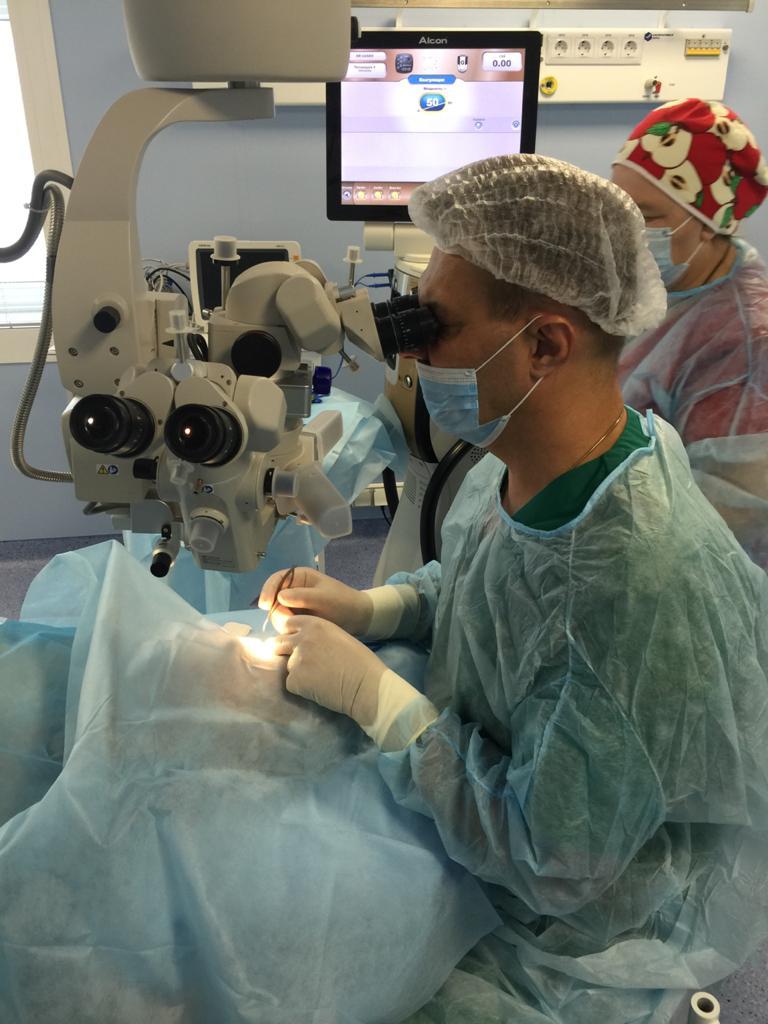
— And how does it depend on age?
— Surgical correction of vision – myopia, hyperopia and astigmatism – can be carried out at the age of 18-19 years and up to 37-40 years. After this age, the effectiveness of these operations decreases. This happens because age-related changes begin in the eye, the so-called presbyopia begins to appear, that is, a violation of the eye's ability to accommodate (focusing vision at different distances).
Let's say we changed the optical properties of the cornea, got perfect vision in the distance, and with the development of presbyopia, a person in this case may lose sight near. That is, with myopia, he will not be able to work comfortably enough at the computer, his eyes will get tired quickly, he will have to wear glasses for close-up vision.
Often, with the progression of presbyopia, patients begin to develop age-related hyperopia, that is, the optical properties of the eye will be unstable. The average patient with nearsightedness in -4 diopters, who had laser vision correction and could see perfectly at all distances until the age of forty, in the future will have to wear glasses to work at a computer, to read small text. It is even possible that he will have to buy glasses for Dali too, because the development of age-related hyperopia may begin, and he will lose visual acuity at almost all distances.
That is why, at a later age, it no longer makes sense to do laser correction, since the patient can get rid of myopia with this operation, but he will not get rid of age-related changes in the eye. At this age, you need to use other ways to change visual functions.
— What happens to patients who begin to have age-related vision changes?
— If this happens to people who have normal vision and there are no optical changes (nearsightedness or farsightedness), and they have had good visual acuity without glasses all their lives, then after 40-50 years the phenomenon of presbyopia begins, farsightedness occurs, the patient is forced to wear glasses for reading and working at the computer. The power of optics can change over the years. Prolonged stress when working at a computer can cause fatigue, dry eye syndrome, and a person still has to drip tear substitutes to remove or reduce discomfort and the so-called computer syndrome.
And people who were nearsighted or farsighted before, as a rule, these optical parameters begin to progress. For example, when a person was young, he wore glasses for + 2, then with age, after forty, he already needs glasses for +3, and after a couple of years for +4. That is, farsightedness begins to increase with age. With myopia, too, a person wore glasses at -5 in his youth, and by the time he was fifty, the doctor prescribed glasses for -7 or -8. It may be observed that with age, myopia begins to increase rapidly in one eye, and slower in the other, and it turns out that there will be -5 in one eye, and -10 in the other.
And what to do when patients with age do not want to wear or change glasses, want to drive a car, play sports, work on a computer without them? In this case, they need to think about replacing the lens. There is a refractive lens replacement, when one's own lens is replaced with an artificial one, or when a cataract begins to develop, phacoemulsification needs to be done – the replacement of a clouded lens. But the principle is the same. The lens, which has age-related changes, changes to artificial, and the patient gets a completely different vision, because modern artificial lenses are of fairly high quality, and if you choose the right one, the patient will see perfectly, brightly and clearly at all distances, the eye will be less tired and watery, perhaps you won't even have to drip tear substitutes in the future, and at the same time, the patient will be able to get rid of lifelong myopia or hyperopia, from astigmatism.
That is, it is a surgical modification of the optical system of the eye, in which the patient receives high vision for the rest of his life, gets rid of glasses, gets long-term comfort, increases the ability to increase his visual loads and the choice of profession or sport. There will be no need in the future to think about what glasses to pick up, whether it is worth going to the doctor and picking up lenses. This operation does not save the patient from the development of some other eye diseases, but it allows the formation of such optics that will not change throughout his life;
— And what harm can laser vision correction do at a young age?
— Nothing. If the operation is performed according to technology, with the calculation of all the features of the eye, carried out by an experienced surgeon, then this operation does not bring any harm. And, as always, all complications with this operation can be associated either with a violation of technology, or when the patient does not comply with the postoperative regime after surgery, which may cause inflammation or a flap displacement, which can lead to complications.
If none of this happens, then the operation is only useful, because it provides an opportunity to live without glasses, get a higher quality of vision, admission to certain professions and sports.
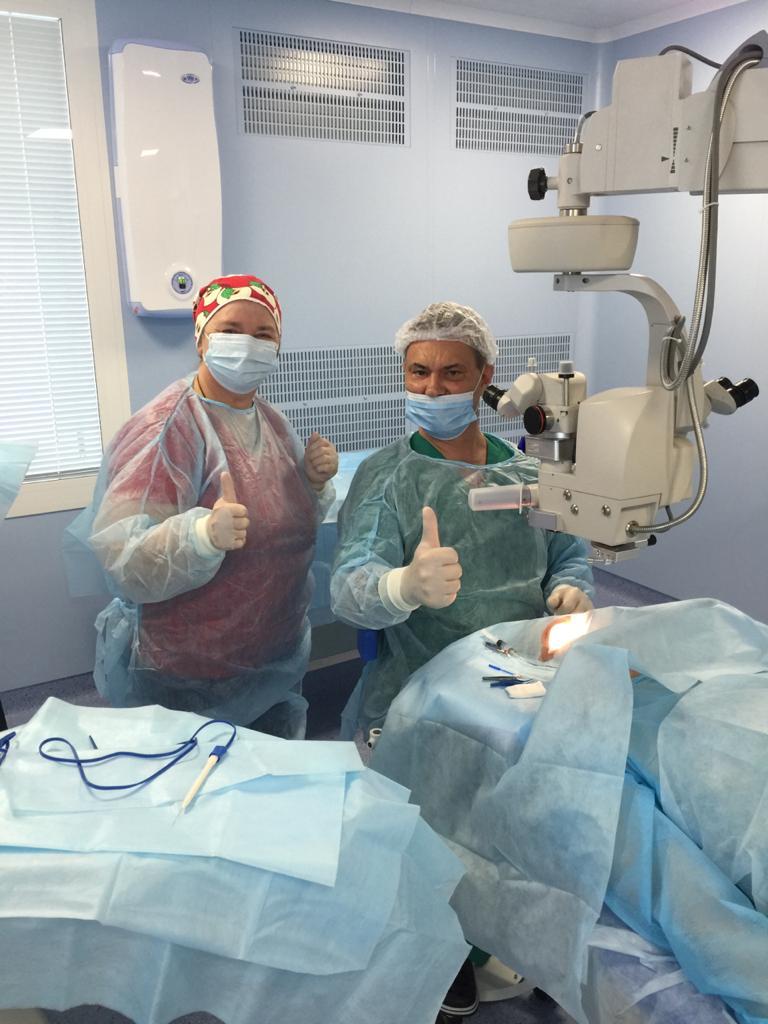
— And then what should those who, for medical reasons, cannot do vision correction do?
— So, use glasses and contact lenses. In some cases, if medical indications consist in the features of the structure of the eye, for example, a thin cornea or diseases after wearing contact lenses, then it is possible to install long-wearing lenses.
— What about those who are afraid to have eye surgery because the process really looks scary? Are there any means that allow you to calm the patient during the operation?
— The patient must make a decision for himself, whether he will perform the operation or not. If there is fear, then he should use glasses and contact lenses, you never need to force, convince or persuade a person. He has to come to it himself.
The procedure of the operation is safe and, with the correct behavior of the patient, eliminates the occurrence of any complications. Moreover, it is performed with a sufficient degree of anesthesia, and one should not be afraid of surgery because it can lead to blindness. These are unnecessary concerns.
— In your book "All Eyes", you talked about how to preserve or correct vision. Please share a few tips for high school students and students.
— They can be advised to start using contact lenses, because some people have complexes when wearing glasses, and the lenses are almost invisible. As I said, after the age of 18, if there are no medical contraindications, you can do laser vision correction, get rid of myopia or astigmatism and increase visual acuity to the maximum possible.
— Tell us what myths there are about vision surgeries, and develop them.
— Usually all these myths consist in ignorance of some medical aspects and technologies and are based only on the fear of patients before this or that treatment, including surgical. Well, imagine: the eye is such an organ that it is more difficult to decide on an operation on it than on an operation on an arm or leg. The physiological fear that something will happen after the operation and the person will go blind, sits deep in the subconscious. Hence all the myths are formed.
"Here, a neighbor said that he had an operation and he became blind or began to see even worse, and therefore the operation cannot be done" – that's how they are born. By the way, they happen both among young people and among age-related patients. Because of rumors and conversations, a person is psychologically looking for an excuse not to do this operation. "Suddenly I will not be lucky, some unusual situation will happen or something else, because I heard somewhere that everything was bad after the operation," he argues, and so a myth is born.
Для того, чтобы таких ситуаций не было, пациент должен понимать состояние своего органа зрения и представлять, как, каким способом и для чего будет проводиться операция, что в ее результате произойдет, и когда он будет знать основной принцип операции, ему будет проще понять, какие есть плюсы и минусы, какие особенности реабилитации, то ему будет проще сделать выбор.
— Как тогда найти хорошего специалиста для проведения этой операции?
— In three ways. The first is when a doctor from a polyclinic recommends going somewhere. The second is advertising on the Internet. And the third – through friends. But in this case, I would trust the doctor's recommendations more, the opinion of those people who have carried out some kind of treatment and know this doctor to advise him.
But before going to this specialist, you need to look at some information about him on the Internet and listen to what this doctor will recommend during the consultation, whether the patient will like him or not, whether he will be disposed to himself as a specialist and as a person, whether he will be attentive enough, whether he owns all modern techniques, which are indicated for the treatment of this disease. If all this coincides, then the patient can safely perform the operation.
Sometimes the patient chooses by advertising. But it is important to understand that aggressive advertising of a clinic is not always really objective and can show its quality. Sometimes medical flaws are hidden behind such advertising. And significantly inflated prices can attract the patient on the one hand, and on the other – repel. Now the choice is very large. I believe that the main thing is the rating and reviews of patients, the experience of the doctor and his qualifications.
— Are there any contraindications to vision correction in addition to a number of eye diseases?
— Here we can name some systemic inflammatory diseases, diseases of the mucous membrane, the mental state of the patient, diabetes mellitus, some neurological diseases. All this should be taken into account during laser vision correction, and then the surgeon already decides whether to give a recommendation for surgery or not.
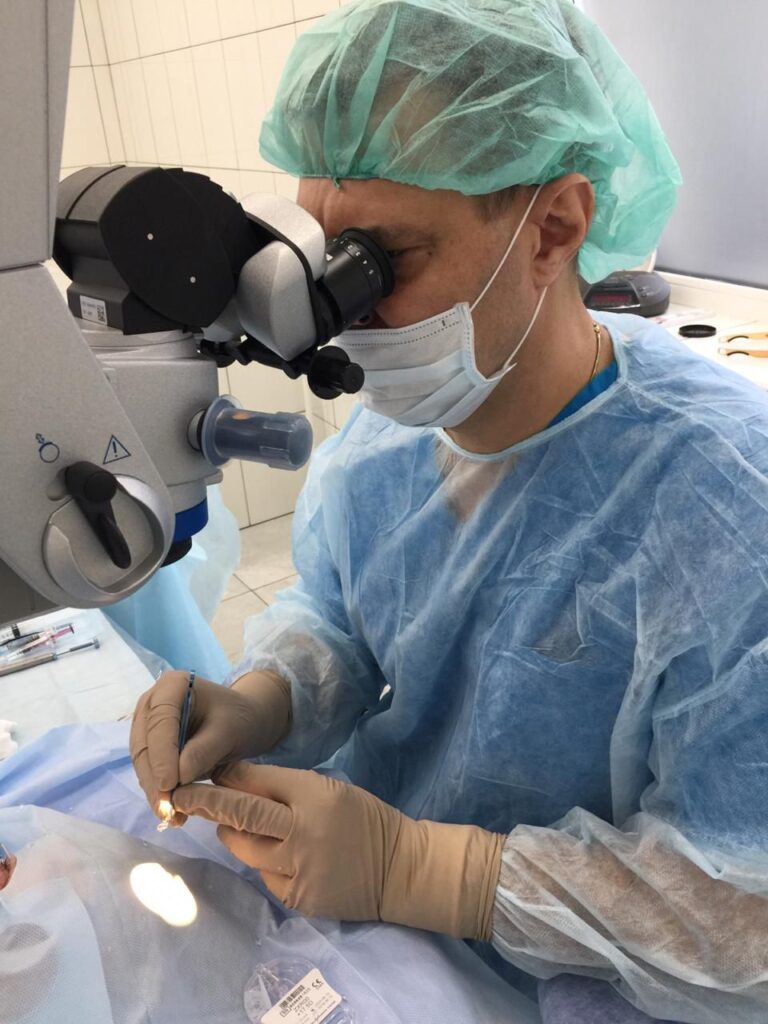
— Tell us the most interesting, funny or simply memorable case from your medical practice.
— I can't remember any specific case. But ophthalmology has its own peculiarities. For example, the law of paired cases is very interesting, it is written about this in my book. Paradoxically, if some peculiarity, complication or unforeseen situation happens during the operation, which can happen once a year or every six months, according to the law of paired cases, this situation may recur in the near future. This happens very often and always twice, and then it may not occur for several years.
Or, if the patient has some kind of complex disease or an interesting ophthalmological feature, then these often go in pairs. A patient comes, and immediately followed by a second, although the disease is rare. And then you can not meet such patients for two or three years.
The law of paired cases – surprisingly – but for some reason it works. It is written in the book – this law can also partly characterize an example when one car mechanic, who was chopping some part of the car with a chisel, a flying fragment hit right in the eye, pierced the eyeball. And two minutes later, the second fragment flies off and hits the other eye in almost the same place. The case is rare, but it characterizes interesting features and cases.
— But the doctors who are on duty on the night shift, you can not wish good night. Are there any similar signs among ophthalmologists?
— Probably the same as surgeons – you can't want a quiet watch. But the main thing is that you can never make a guess. When an ophthalmic surgeon goes to the operating room, you should not tell him that he will do everything quickly and hold it. Because if a person says that he will finish by two o'clock, then for sure this will not happen. And to say that it will be an easy, standard operation without features. it is also never necessary, because, according to the law of meanness and medical specific working conditions, it is very easy to jinx or not take into account something.
An experienced doctor will never say that now he will quickly cure and immediately operate without complications, because this is sometimes fraught with consequences. This should always be taken seriously and explained that even if the disease is common and its treatment is not associated with any risks, it is impossible to be completely sure that this is an elementary case. And, moreover, to tell everyone that you will cure it easily and quickly. We can only hope that the operation will be standard.
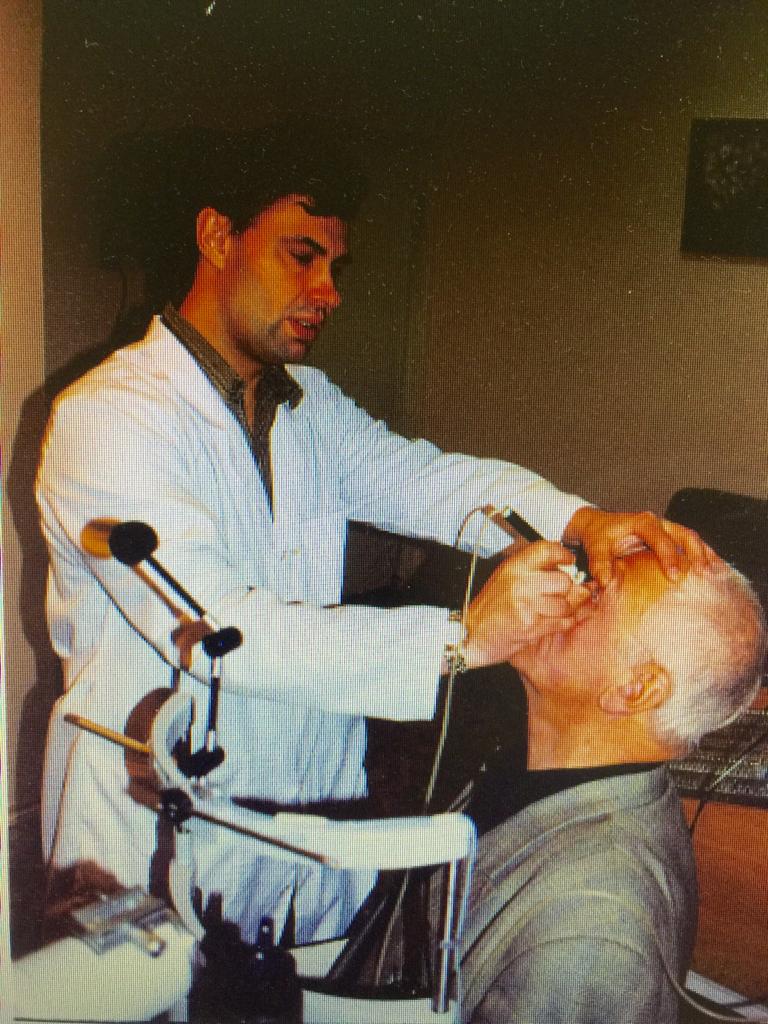
We thank Yuri Alexandrovich for the interview!
